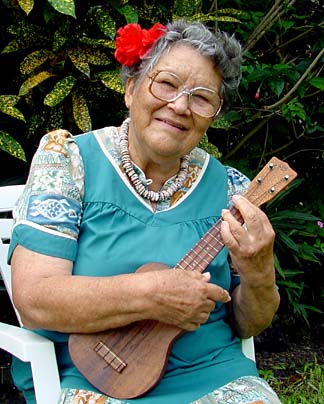
FILE PHOTO
"I'm handing in my resignation. I want to quit while I'm ahead." --Aunty Nona Beamer, Hawaiian musical matriarch
Aunty Nona plans
to hang up her hula skirtThe songwriter and teacher
may perform for the last time
as her tour ends Saturday
PAHOA, Hawaii >> After 77 years of dancing, singing and playing the ukulele, Aunty Nona Beamer thinks it's time to get off the stage.
"I'm handing in my resignation," she says with a chuckle. "I want to quit while I'm ahead."
The songwriter, hula teacher and Hawaiian cultural authority turned 80 on Aug. 15, and expects her last performance will be on Saturday night at Diamond Head Theatre when she, son Keola, and other members of the Beamer family conclude a statewide tour that began in early July.
"I want to help in any way I can. Maybe I will dance sitting in a chair," she said, leaving the door for further performances slightly ajar.
Winona Kapuailohiamanonokalani Desha Beamer is the matriarch of the musical Beamer family and one of the world's foremost authorities on Hawaiian culture.
Known throughout the islands as Aunty Nona, she was born in Honolulu of Hawaiian, German, French, Scottish and Swedish ancestry, but was raised in Napoopoo in South Kona, where she recalls first performing at age 3. Her Hawaiian name is an ancestral name that comes from Princess Manono and means precious flower.
Her parents were Pono Beamer, a fisherman and songwriter, and his wife, Louise, a school teacher and kumu hula. Her paternal grandmother, and a major influence in her life, was Helen Desha Beamer, a prolific songwriter and kumu hula.
"I remember a very happy life in Napoopoo," she said. "It was a good life."
In 1949, Beamer began teaching Hawaiian culture at Kamehameha, and remained there for nearly 40 years. She also took over her mother's hula studio and taught hula in Waikiki for 30 years.
She lived at the Beamer Ranch in Waimea on the Big Island for a while, when sons Keola and Kapono were young.
"I wanted them to know their grandparents. They were good role models for my sons," she said. Beamer, now a resident of Hilo, also has a hanai son and daughter and a grandson.
Beamer's teaching career actually started at age 12 at the old Kakaako Mission School.
"We were teaching the old stories as a way of having children learn about their heritage," she said.
But the Hawaiian chants were "spooky" for the children, so she added a few musical notes.
"It was nothing great, but these songs made the history come to life for the children," she said. She can't remember how many songs she has written but said a lot were to illustrate lessons for children.
Since retiring as a classroom teacher, Beamer has remained active sharing her extensive knowledge of Hawaiian culture with various groups and at numerous workshops. At the annual weeklong Aloha Music Camp she operates with son Keola, Aunty Nona shares not only her knowledge of Hawaiiana, a term she coined in 1948, but her stories of growing up as a Hawaiian.
She is "a repository of knowledge," said Liko Puha, a chanter and student at the University of Hawaii-Hilo.
"It wasn't until I was about 70 that I felt I was doing good as a Hawaiian," Beamer said. "Now I can be proud to be a Hawaiian. It was a long time coming after years of feeling shame."
For the past 33 years, she has awarded scholarships to six Kamehameha seniors for college-level study in Hawaiian music and culture.
Twenty years ago, with Honolulu businessman Richard Towill, she started Ka Himeni Ana, an organization that holds an annual competition to encourage young musicians in what she called "soft Hawaiian music without amplification."
She also helped start the Hula Preservation Society, a nonprofit organization which works to preserve and perpetuate the native Hawaiian dance.
Beamer now plans to concentrate her efforts on development of a learning center on 20 acres of land in Honomu on the Big Island's Hamakua Coast.
The complex would include educational facilities, a dining hall and dormitories. She is seeking funding for the project, and plans eventually to deed the property in perpetuity to the Kamehameha Schools.
"I hope to have the music camp there in 2005," she said.
